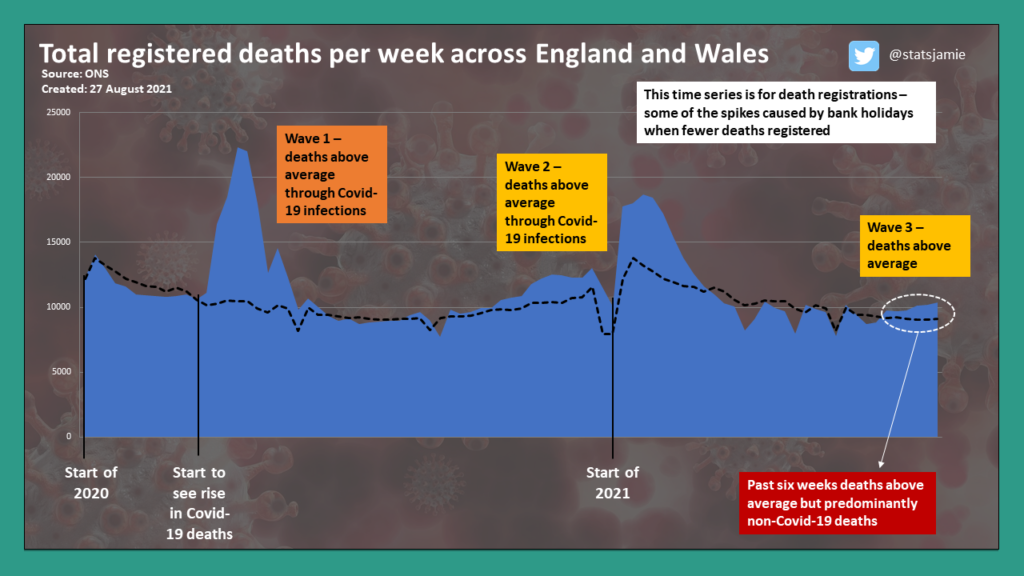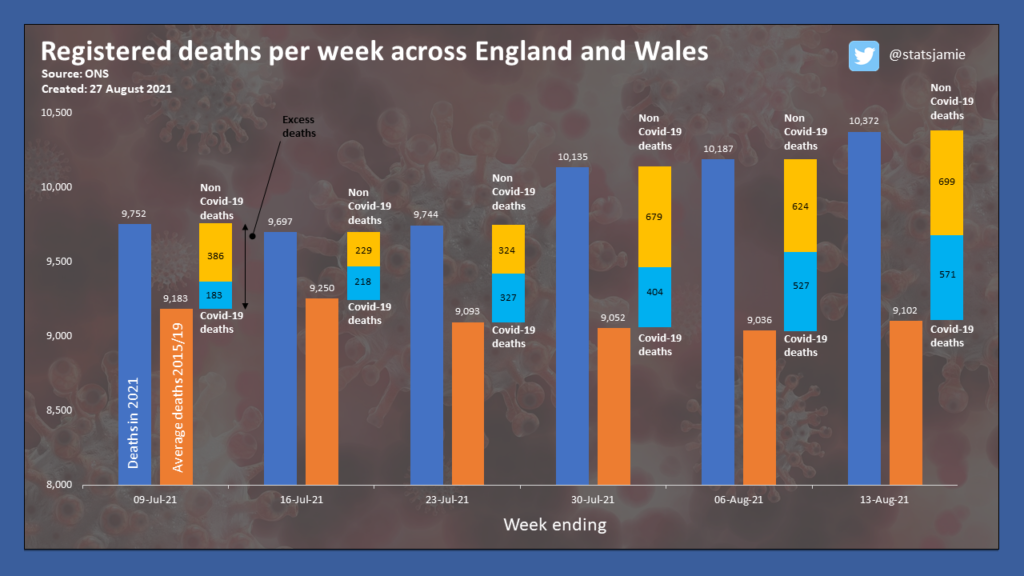Deaths in England and Wales have been above average for the past six weeks and we continue to see more people die at home than expected and fewer deaths in hospital. Rises in deaths related to Covid-19 can not explain the excess deaths and this may be the start of the collateral damage of restrictions on healthcare over the past 18 months.
What are excess deaths?
We can look at recent trends in mortality to estimate how many deaths you would expect in any week. If deaths are above expectation, we call these excess deaths. We can use average deaths over the period 2015 to 2019 to estimate the expected number of deaths for a particular week and compare that to what has happened through the pandemic.
Excess deaths through 2020 and 2021
It was around the middle of March 2020 we started seeing a significant rise in deaths across England and Wales (and the wider UK) and deaths returned to normal levels for the time of year by June 2020. We then saw deaths return above average for the time of year during the second wave of the virus before dropping back again from around March 2021. Deaths then remained below average for many weeks, but around six weeks ago, we saw a gradual rise in deaths above average again.

So what is going on recently?
In recent months, we have seen a rise in Covid-19 cases within the UK but with many people, including the vast majority of the vulnerable having antibodies from a vaccine or prior infection we have seen deaths around 90% lower than in the past.
However, since the week ending the 09 July, we have seen deaths return above average for the time of year, but we cannot attribute all of this to increases in Covid-19 deaths. In the past six weeks, there were 59,887 deaths registered in England and Wales, 9.5% higher than the number of deaths registered over the period 2015/19. Of the 5,171 deaths above average, only 2,230 can be attributed to deaths registered with Covid-19 on the death certificate. So we are now seeing more deaths above average not related to Covid-19 than the total number of deaths linked to Covid-19.
The trend is more concerning because, as I previously wrote, some of those dying with Covid-19 may have sadly died now from other causes. Also, with significant numbers of people dying above average since the start of 2020, you may expect fewer deaths because some deaths you may expect to happen now may have occurred earlier in the pandemic.

Conclusion – missed healthcare causing deaths?
Other information from ONS shows that the number of people dying from home has been above average since the start of the pandemic and since March of this year the number of deaths in hospital is below average. Many have raised alarm at patients missing a diagnosis over the past year with fewer GP appointments, and we have seen increasing waiting times for those within the health system.
Maybe we are seeing the hidden cost of the pandemic and the collateral damage of the restrictions imposed. The consistent messaging of ‘Protect the NHS’ may have led to many staying away to not be a burden. Sadly, decisions made over the past 18 months will inevitably lead to many deaths because of the missed diagnoses. We could be at that point in time the impact of this is showing up within the official data.
Some will argue the demand Covid-19 put on the health system meant it was not possible to continue to run GP practices and outpatient services to the level we would have seen had there been no pandemic. But what we know is that in years to come, the death toll because of the measures put in place may cause more deaths from the collateral damage of the restrictions imposed, rather than from Covid-19 itself. As more data emerges from the effects of decisions made in the past, this evidence is important to reflect on for decisions made in the future.

